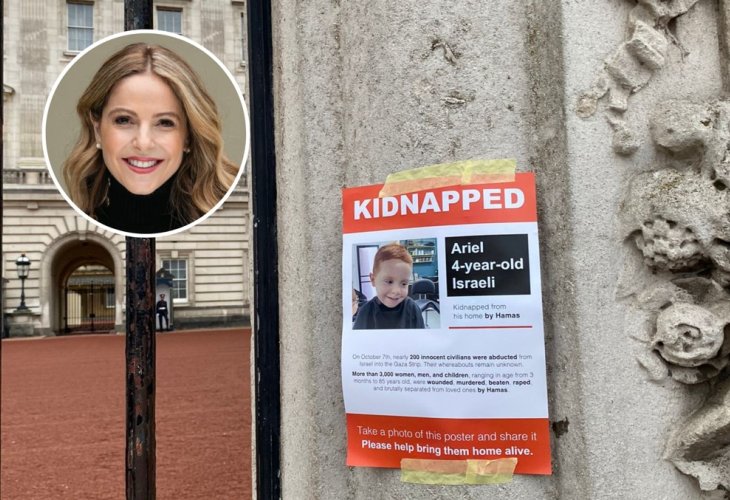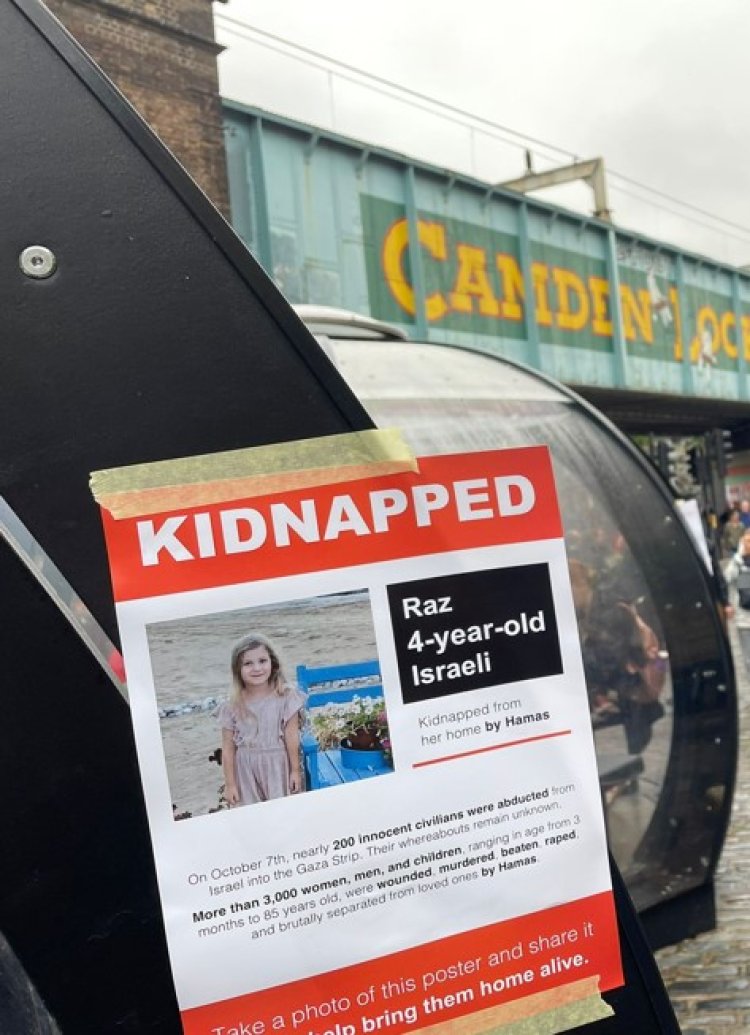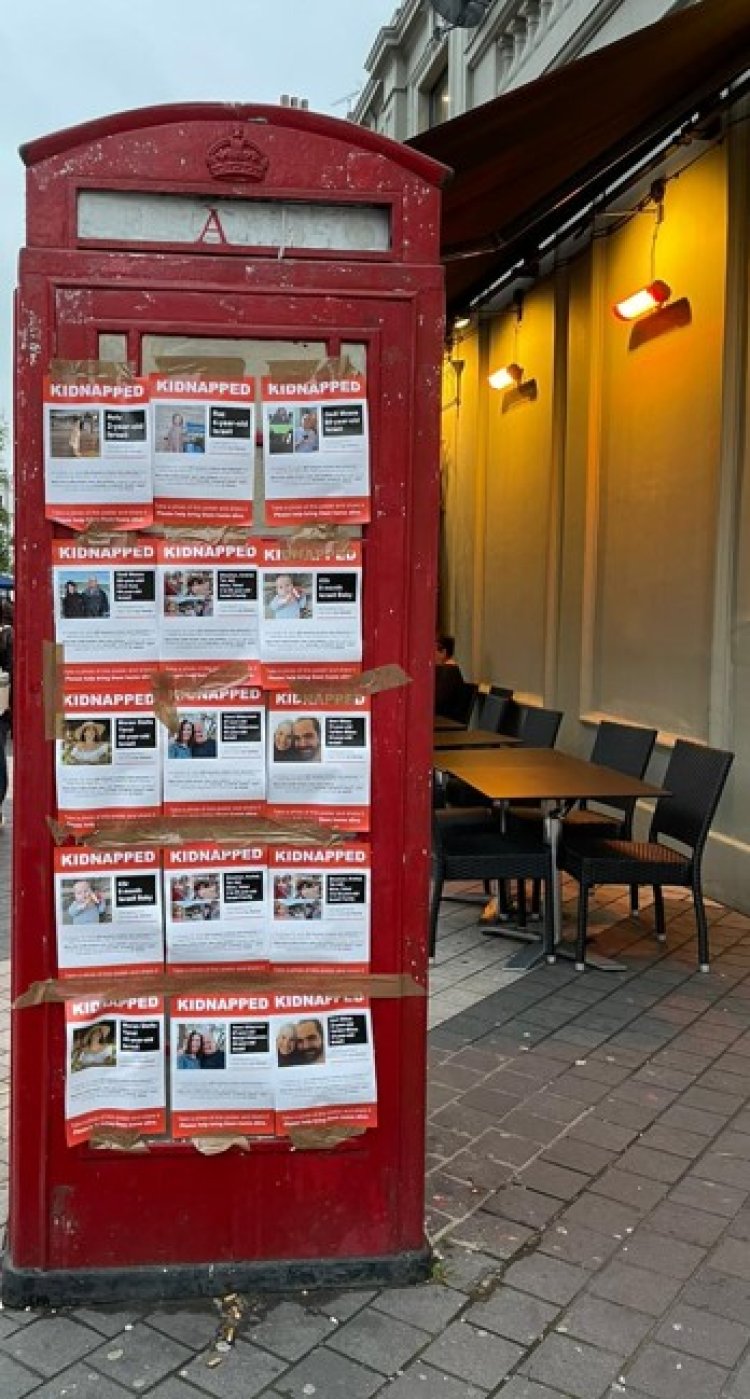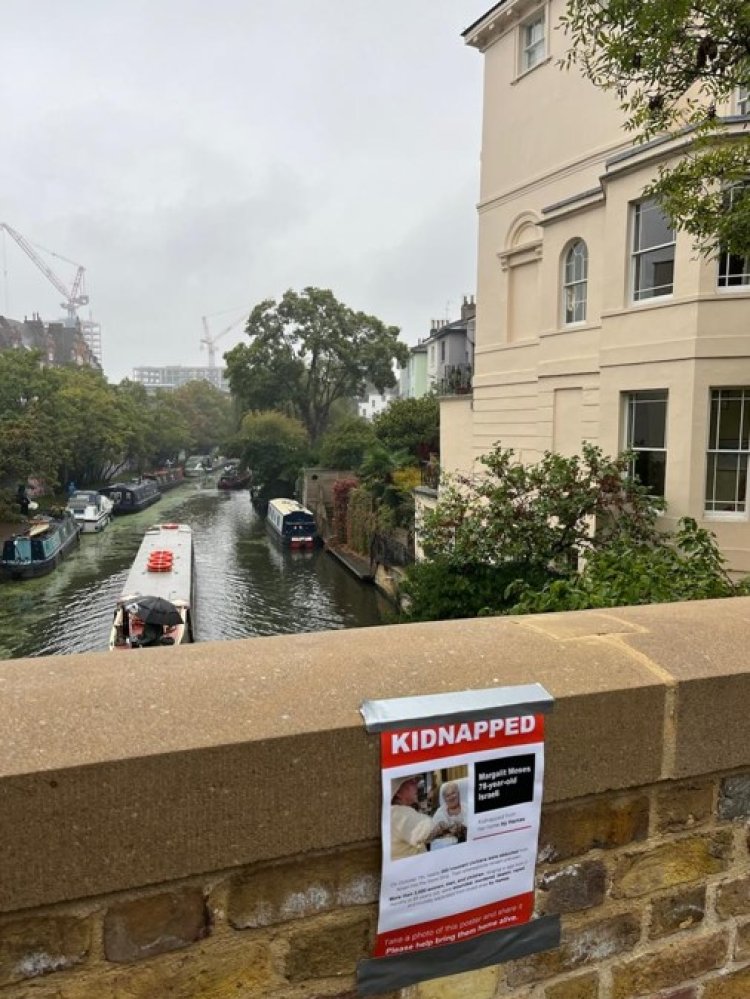The Israeli Woman on a Global Advocacy Mission: "The Silence in Europe Was Deafening Against the Atrocities in Israel"
Michal Oshman, an Israeli resident of London, embarked on an advocacy journey across Europe for Israel: "We published images of the hostages on TV, billboards, and small street signs. We won't let this issue fade away."

The shock from the massacre carried out by Hamas terrorists in the settlements around Gaza during Simchat Torah did not spare Michal Oshman, a former executive at Facebook and TikTok, who has lived in London for 20 years. Her second wave of pain on that day came when she decided to watch the news on the evening of the holiday in the cold country. "We opened the screens, and against the horrors that occurred in Israel, we heard a dreadful silence in the international news," she describes. "We couldn't stand the thought that this disregard for what happened in Israel would continue like this." A week and a half later, Michal looks in amazement at the international advocacy hub she and her husband built to bring the issue to the forefront. "I now have three mobile phones in hand, trying to find a way to manage all the many calls coming in."
A Family's Advocacy Hub
"I never dealt with media; until recently, I was an organizational culture consultant at TikTok, and my husband works in financial investment companies," Michal opens up. However, the events of Simchat Torah changed everything. "We realized the situation in Israel on Saturday morning when my mother's mobile phone wouldn't stop flashing, and due to emergency concerns, she checked what was happening. On that day, the sun shone brightly, a rare sight in London at this time, and everyone continued with the holiday joy, only we knew what was happening. On the evening of the holiday, the pain intensified as we opened the screens and discovered there weren't enough reports in London about the situation in Israel. The news broadcasts remained relatively quiet. In those moments, a strong urge arose in us to do something, even from a distance."
Very quickly, Michal and her husband Yair took action. "We picked up phones and decided to use all the connections we've ever had to assist in advocacy for Israel. Our aim was to reach major news networks—BBC, Sky News, Channel 4, and more—to significantly bring the story of the terrible massacre to the world's attention. A few hours later, we started receiving calls from different TV networks, and we directed appropriate interviewees to them. It wasn't an easy task—they were looking for interviewees from European countries, locals who spoke the language, and they had a clear preference for civilians over military personnel."

Despite the limitations, the couple managed to coordinate dozens of interviews. "In England, there are families whose world collapsed upon hearing of the harm to their loved ones in Israel. Even my daughter's school was touched by grief after learning that a student there was killed in the terrorist attack. I found myself briefing families on what to say, and I spoke with them afterward. Thus, over three days, we worked to bring Israel's story to the forefront as much as possible."
As time passed, the "Oshman Hub" began operating in other ways. "We printed images of the hostages and sent volunteers to hang them across cities—in England, Germany, Spain, and more. We created massive poster advertising in large shopping centers," Michal describes. "Even here, the matter wasn’t easy. Billboard owners worried about vandalism, so only those with billboards high enough, where they couldn’t be reached, agreed to post them. I found myself explaining to one billboard owner the height of his sign so he would understand that it won’t be vandalized. We also made efforts for a moment of silence in football stadiums before games began, and continued with great intensity coordinating interviews on media networks."
The most painful focus where Michal and her husband decided to act was workplaces. "When there was the Black Lives Matter protest in the U.S., all major companies expressed support. Once the war in Ukraine began, everyone raised blue-and-yellow flags as a sign of support for a country fighting for its freedom. But now—no one is going to raise a blue and white flag, and even more—workplaces hardly acknowledge what happened."Hundreds of Jewish employees approach me saying that they aren’t even asked how they are doing. Someone told me, 'My boss saw me with tears in my eyes, yet she continued talking to me as if everything was normal.' David Baddiel, a Jew who describes himself as an atheist, previously wrote a book titled 'Jews Don't Count'—expressing that Jews aren’t considered. The prevailing assumption in the world is that Jews are rich, those who run the world, and even now, subconsciously, people tell themselves, 'The Jews will cope, and moreover—they’ll leverage this trouble for their benefit.'
The Safest Place in the World
How Does Global Advocacy Benefit Us?
"Public opinion in the world is about to change any moment. Europe tends to side with the weaker party, and residents of Gaza are perceived as the weaker, subjugated people. Soon, images will start flowing from the bombed Gaza Strip, and then world opinion will again tilt in their favor. Therefore, it's crucial for us that the images of the hostages are everywhere, so everyone remembers what we're fighting for. There’s a strong discourse in Europe about proportional response, and we want to break this conception, to clarify that it’s not about a response, but the destruction of an enemy."
Despite the difficulty, the massive advocacy is impactful. "The Prime Minister of Britain, Rishi Sunak, visited the Jewish synagogue a few days ago and expressed absolute support for Israel. Other countries, like Germany, joined the declarations of support, and they ban the display of Hamas flags or support demonstrations for the terror organization. That's why it's so important to me that when the son of the British Prime Minister travels tomorrow by subway, he sees the images of the hostages and tells his father about it. It influences decision-making on the diplomatic level. Additionally, this has an economic aspect. If we want to continue seeing companies invest money in Israel, or create collaborations with Israeli companies—the world’s opinion must be in our favor. The scales have been tipped against us for decades, and it’s crucial they shift as much as possible the other way."

What is the Feeling of Jews in London Now?
"We are experiencing a severe sense of alienation; it's very unpleasant to be here. Jews, who never thought of making Aliyah, say 'We just want to leave here.' Last Friday, there was a call for a global Jihad Day, and the fear was palpable. The British government allocated three million pounds for protecting Jewish communities, and last Shabbat, helicopters hovered over our synagogue to secure it. Across from my house is a mosque, and sometimes I fear that a hot-headed person might come out and who knows what he’ll do. However, the Jewish communities themselves are amazing—before I even finish writing a request in a message, I already have what I need. There is tremendous brotherhood here and genuine concern for Israel. In the past week, communities have raised three million pounds, which were sent as aid to the Jews of the land. This happens, by the way, in all Jewish communities worldwide."
From here, Michal returns to the feeling of insecurity in London: "A few days ago, I told my husband 'I'd like to escape from here,' but there’s nowhere to go. There’s nowhere in the world without anti-Semitism. In the most absurd way—Israel is the safest place for Jews, despite all the horrors we’ve seen. On the night of Simchat Torah, I went to sing Simchat Torah songs with Lily Ebert, a 99-year-old Holocaust survivor who wrote the bestselling book 'Lily's Promise.' That evening, she told me: 'The thing I regret most is not staying to live in the Land. The only place for Jews is Israel.'"


